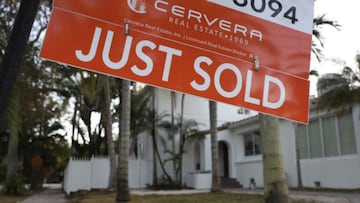Is the government mortgage stimulus relief program real?
Many in the US are struggling to make mortgage payments on time and looking to Congress for help. Does the reconciliation bill provide real relief?


On Monday, after weeks of negotiations between the White House and conservative Democrats Joe Manchin of West Virginia and Kyrsten Sinema of Arizona, a deal was announced.
Press Secretary Jen Psaki told reporters that “Senator Manchin says he is prepared to support a Build Back Better plan that combats inflation, is fiscally responsible, and will create jobs,” adding that the plan will be “fully paid for, will reduce the deficit, and brings down costs for health care, child care, elder care, and housing.”
However, Joe Manchin has since stated that he will not vote on the package until its impact on the deficit is evaluated.
At the same time, Sen. Manchin has urged House Democrats to pass the bipartisan infrastructure plan quickly. This suggestion is a complete non-starter for Progressives who have made it clear they will not vote on the infrastructure plan until a vote on the reconciliation bill is held.
Benefits for homeowners in $1.75 trillion reconciliation package
According to the Eviction Lab, a platform that tracks evictions, more than 7,682 landlords have filed paperwork to have their tenants evicted this week.
Many homeowners had hoped Congress would include some support after many households struggled to make their mortgage payments after losing their jobs. At this point, the revised $1.75 trillion reconciliation package does not include mortgage relief for homeowners.
What are SALT deductions?
One more controversial aspect included in the $1.75 reconciliation bill is the extension of the State and Local Taxes (SALT) deductions passed as a part of the 2017 Tax Cut and Jobs Act. Through that legislation, Republicans capped the amount of taxes households pay in SALT at $10,000.
While initially seen as a more conservative measure, some Democrats have embraced it. No Republicans plan to vote on the reconciliation bill, so its inclusion is not an attempt to garner their support.
The Committee for a Responsible Federal Budget (CFTB) called this move “regressive” and found that “A five-year repeal would cost roughly $475 billion, with $400 billion of the tax cut going to the top 5 percent of households.”
The CRFB also stated that he move is opposed by organizations on the right and the left including “Tax Foundation, the Center on Budget and Policy Priorities, ITEP, the American Enterprise Institute, the Heritage Foundation, the Manhattan Institute, the Progressive Policy Institute, the Brookings Institution, the Center for American Progress, the Committee for a Responsible Federal Budget, and others.”
Related stories
However, the motivation behind the Republican attacks on the SALT deduction should be questioned after they supported the measure in 2017. Now calling it a "tax shelter for the rich" is strong language after organizations like the Tax Policy Center found that the legislation would "boost the after-tax incomes of households in the top 1 percent by 2.9 percent by 2025, roughly three times the 1.0 percent gain for households in the bottom 60 percent."
While lawmakers who support the extension say that the revenue will be made up in 2026 when the tax cuts end. However, many organizations argue that the cuts could be extended again, which could lead to a trillion-dollar loss in tax revenue over the next decade.
- Bernie Sanders
- Covid-19 economic crisis
- Science
- Mortgages
- Coronavirus Covid-19
- Economic crisis
- Mortgage market
- United States
- Pandemic
- Coronavirus
- Recession
- North America
- Economic climate
- Virology
- Outbreak
- Infectious diseases
- Financial markets
- Diseases
- Microbiology
- America
- Medicine
- Economy
- Finances
- Biology
- Health
- Life sciences